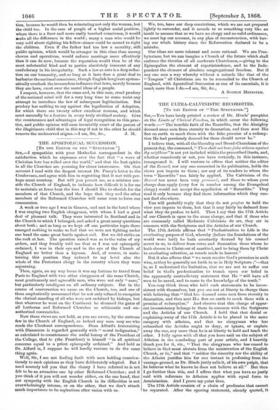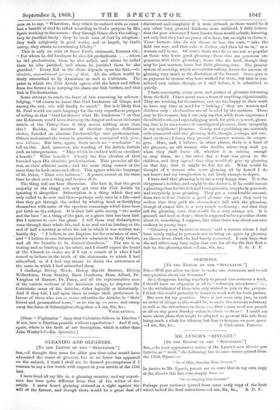THE ULTRA-CALVINISTIC RECORDITES. [To THE EDITOR OF "THE SPECTATOR."] SIR,—You
have lately printed a review of Dr. Hinds' pamphlet on the Limits of Clerical Freedom, in which occur the following words :—" The horrible faith of the Recordite, that the Almighty doomed some men from eternity to damnation, and then sent His Son on earth to mock them with the false promise of a redemp- tion He had previously decreed for them should never be."
I believe that, with all the liberality and Broad-Churehism of the present day, the command," Thou shalt not bear false witness against thy neighbour" is not yet included within the prescribed limits, and, whether consciously or not, you have certainly, in this instance, transgressed it. I will venture to affirm that neither the editor of the Record, nor any one connected in its publication, holds the views you impute to them ; nor any of its readers to whom the term " Recordite" can fairly be applied. The Calvinism of the Record has never been very prononce, and those to whom your charge does apply (very few in number among the Evangelical clergy) would not accept the appellation of " Reeordite." They read it only because they find there information which they can- not find elsewhere.
You will probably reply that they do not profess to hold the view you impute to them, but that it may fairly be deduced from what they do profess to hold. Then 1 say that the 17th Article of our Church is open to the same charge, and that if those who are commonly called Moderate Calvinists do err, they err in common with the Scriptures and the Articles of our Church.
The 17th Article affirms that "Predestination to Life is the everlasting purpose of God, whereby (before the foundations of the world were laid) he hath constantly decreed by his counsel secret to us, to deliver from curse and damnation those whom he bath chosen in Christ out of mankind, and to bring them by Christ to everlasting salvation, as vessels made to honour."
But it also affirms that "we must receive God's promises in such wise, as they be generally set forth to us in Holy Scripture ;"—that is, as I understand the limitation, that we are not to suffer our belief in God's predestination to trench upon our belief in the apparently contradietofy statement that He "will have all men to be saved, and to come to the knowledge of the truth."
You may think those who hold such statements to be incon- sistent with themselves, but you are not at liberty to charge them with believing that " God has doomed some men from eternity to damnation, and then sent His Son on earth to mock them with a promise of redemption." And observe that this charge of appar- ent inconsistency belongs to them in common with the Scriptures and the Articles of our Church. I hold that that denial or explaining-away of the 17th Article is to be placed in the same category with atheism, and that no clergyman who has subscribed the Articles ought to deny, or ignore, or explain away the one, any more than he is at liberty to hold and teach the other. I fully agree with all that you have said on the subject of Atheism in the concluding part of your article, and I heartily thank you for it, viz., "That the clergyman who has ceased to believe in God must abstain from the ministration of the English Church, or lie," and that "neither the sincerity nor the ability of the Atheist justifies him for one instant in professing from the vantage-ground, as Dr. Hinds justly calls it, of his own pulpit, that he believes what he knows he does not believe at all." But then I go further than this, and I affirm that what you have so justly said with reference to Atheism applies with equal force to Arminianism. And I prove my point thus.
The 17th Article consists of a chain of predicates that cannot be separated. After the opening statement, already quoted, it goes on to say, "Wherefore, they which be endued with so excel- lent a benefit of God be called according to God's purpose by His Spirit working in due season : they through Grace obey the calling : they be justified freely : they be made sons of God by adoption : they walk religiously in good works, and at length, by God's mercy, they attain to everlasting felicity."
This is only an echo of Saint Paul's statement, Romans viii., "For whom he did foreknow he also did predestinate. . . . whom he did predestinate, them he also called, and whom he called them he also justified, and whom he justified them he also glorified." Every link in the chain depends upon the first,—the absolute, unconditional purpose of God. All the others would be freely subscribed to by Arminians as well as Calvinists. The point in which the 17th Article agrees with the latter and differs from the former is in carrying the chain one link further, and that link is Predestination.
Some attempt to evade the force of this reasoning by acknow- ledging, "Of course we know that God foreknows all things, and among the rest, who will finally be saved." But is it likely that St. Paul would use such language for the very superfluous purpose of telling us that "God foreknows what He foreknows"? or that our Reformers would have drawn up the longest and most elaborate article of the Thirty-Nine if they meant nothing more than this ? Besides, the doctrine of election implies deliberate choice, founded on absolute foreknowledge and predestination. Others understand the terms in question as connected with fore- seen holiness. But here, again, there needs no " revelation " to tell us this. And, moreover, the wording of the Article forbids such an interpretation. "They which be endued with so excellent a benefit." What benefit ? Clearly the free election of God founded upon His absolute predestination. This precedes all the rest, as their efficient cause ; and the same thing cannot at the same time be both cause and effect. This agrees with the language of St. Peter, "Elect unto holiness." A person cannot at the same time be elect unto a thing and because of it.
The thing will not bear discussion. The fact is, that the great majority of the clergy can only get over the 17th Article by ignoring it altogether. Subscription is a thing which they are only called to do now and then—perhaps only once in a life—and then they get through the ordeal by winking hard or fortifying themselves with some of the specious reasouiugs which have been put forth on the subject. It is then laid aside among "the moles and the bats" as a thing of the past, or a ghost that has been laid. But I venture to raise the ghost. I tell them that Subscription runs through their whole life, and is as real and as binding at the end of half a century as when the ink in which it was written was hardly dry. "I believe in one Baptism for the remission of sins," and "I believe in one Subscription for admission to Holy Orders, and all the benefits to be derived therefrom." The one is as testing and as binding as the other, and I should expect the bread of the Church to choke me if I eat a crumb of it after I had ceased to believe in the truth of the statements to which I had subscribed, or if I had any reason to doubt the correctness of the sense in which I had subscribed them.
I challenge Bishop Hinds, Bishop Harold Browne, Bishop Wilberforce, Dean Stanley, Dean Goulburn, Dean Alford, Dr. Vaughan of Harrow, Dr. Pusey, and all the representative men of the various sections of the Arminian clergy, to disprove the Calvinistic sense of the Articles, either logically or historically. And if they fail, I call upon them to resign their preferment in favour of those who can ex animo subscribe the Articles in "their literal and grammatical sense," or to rise up en masse and sweep away the farce of Subscription altogether.—I am, Sir, &c.,
VIOLLANTIUS.
[Does " Vigilantius " deny that Calvinists believe in Election ? If not, how is Election possible without reprobation ? And if not, again, where is the fault of our description, which is softer than John Wesley's ?—ED. Spectator.]































 Previous page
Previous page